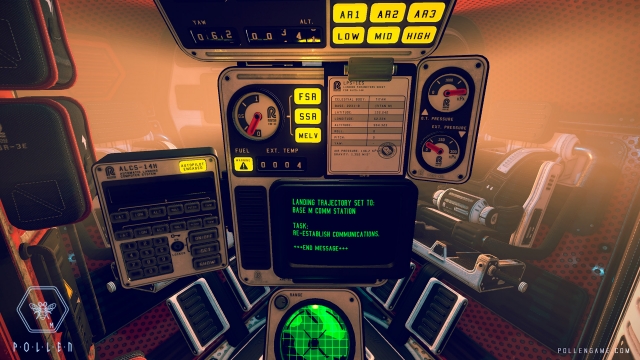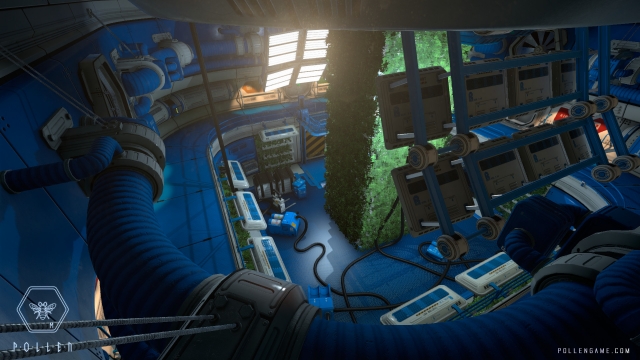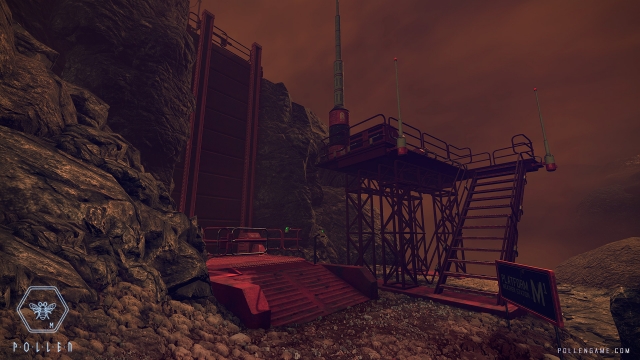
P.O.L.L.E.N. Review
For some, gaming is merely a direct form of entertainment. For others, it is an opportunity of escapism, to take over the body of a fictional character and to transplant any consequences of your own actions onto them. For Mindfield Games, developers of P.O.L.L.E.N., gaming is an opportunity to investigate one’s “responsibility of self”, as they have put it. Thus, P.O.L.L.E.N. is a first person, exploration game set on one of Saturn’s moons, Titan. As is often the case in space games, danger is always imminent, and death is a very real possibility. It is the player’s responsibility to guide their space technician to safety in the midst of a storm, and to unravel the game’s storyline piece by piece.
The world of P.O.L.L.E.N. is one in which JFK was never assassinated. Instead, USA and USSR have joined forces, resulting in technological advances that have allowed greater exploration of space for resources. As a consequence of this focus on space travel, domestic technology is not so advanced as we have experienced it in our own world. Home computers are not yet commonplace by the year 1995. Having a computer at your desk is more science fiction, whereas freely exploring Saturn’s moons is a perfect reality.

This lack of domestic technological advance is apparent throughout gameplay - to piece together the story, you do so by interacting with objects around Base M. Almost all visual objects can be interacted with in some way, and investigating various dials, switches and audio tapes quickly becomes an immersive and enjoyable task. Robotic voices and pixelly, green text all pay homage to the basic computer systems, and the machinery appears basic and dated to the modern player.
Visually, P.O.L.L.E.N., is stunning. You observe the world through the marbled glass of your helmet, and the environment seems suitably vast and formidable, despite the fact that you can do very little exploration of the outside world before an explosive and awesome storm forces you to retreat inside. The gentle bob of your steps is a pleasing reminder of the lack of gravity, and the sluggish controls and mouse movements simulates the difficulty of movement in space. The pace does not suffer, however, as a crack in your helmet sounds alarms within your suit, and the pressure builds as you hear your breathing become more laboured and frantic as you race for your life into the base. The frustration of your limited movement would usually have a negative impact on your impression of a game, but here it simply transplants the sense of urgency from the character at your hands, to yourself as the controller. I found myself sweating and urging, “Come on,” at my screen as I fumbled with a particular switch to allow me to enter the building and to my safety.

The environments are densely packed with interactable objects, the walls are pasted with posters to be read, folders can be ransacked and shelves can be poked through. Although the items are largely mundane, none of them feel like they are mere space fillers. They each serve some form of purpose, even if that purpose is for realism’s sake. Every item is highly detailed and authentic. Investigation and revealing the story is achieved with sheer curiosity and basic puzzles on your progression through the base. Mindfield Games have pulled out all the stops to ensure that P.O.L.L.E.N. is an immersive and intriguing, story-led experience, rather than a walking simulation. There is no player hand-holding whatsoever - no indications on where to go next. Listening closely to tapes for clues and thoroughly examining your surroundings is the only way to glean clues as to what is expected of you next. The voices which speak over the audio tapes speak of an “Entity”, and leave you thirsting for more information, whilst really expressing the harrowing and mysterious nature of the disappearance of the residents of Base M. The initial urgency of the game gives way to a marvelous build up of suspense and intrigue.
I won’t ruin the ending. All I will say is that it was a complete disappointment. The end sections of the game feel somewhat rushed compared to the lavishly crafted opening parts, as though all of the makers’ best efforts had already been spent.
It would have been nice to see a little more of a cause and effect pattern during the game - you find yourself experimentally toying with switches and buttons, only to find they have little or no effect at all. Although they provide a satisfying level of reality to your surroundings, it seems a little pointless to include functionless machinery. And although you can interact with different objects in different ways, and you can even have multiple saves so that you can advance in the story differently on each, it still feels somewhat linear - progression points are fixed. Over time, the sense of danger and urgency founded by the threat of the “Entity” dissipates - it becomes obvious that you have all the time in the world to interact, explore and investigate, and nothing bad will happen. Mindfield Games stresses their desire that P.O.L.L.E.N. should behave as an authentic experience for the player in an alternate world, but the emotional responses just never have time to develop. The game can be played through within a couple of hours, and although you should play through multiple times and discover the story of Base M through various mediums, it just doesn’t feel like there’s enough of the game to become wholly immersed into.

P.O.L.L.E.N. is a visually stunning and well crafted exploration game, and the detail that has been put into the small world by Mindfield Games is remarkable. The recognition that, as players, we don’t always need the game to hold our hands in order to progress is refreshing. But there feels like there could be so much more somehow. Exploring the surface of Titan for more than a few moments in the opening sequence would have widened the scope of the game considerably, and it begins to lose its grasp on the player the further the game progresses. The game has VR capability, and I can only imagine that this would be an enormous asset to the game - it is simply made for virtual reality. But, at £18.99 at the time of review on Steam, for just a few hours at most of gameplay, P.O.L.L.E.N. is a little pricey for what you can squeeze out of it.
This game is good, with a few negatives.
P.O.L.L.E.N. is a visually stunning and well crafted exploration game, and the detail that has been put into the small world by Mindfield Games is remarkable. The recognition that, as players, we don’t always need the game to hold our hands in order to progress is refreshing. But there feels like there could be so much more somehow. Exploring the surface of Titan for more than a few moments in the opening sequence would have widened the scope of the game considerably, and it begins to lose its grasp on the player the further the game progresses. The game has VR capability, and I can only imagine that this would be an enormous asset to the game - it is simply made for virtual reality. But, at £18.99 at the time of review on Steam, for just a few hours at most of gameplay, P.O.L.L.E.N. is a little pricey for what you can squeeze out of it.






COMMENTS